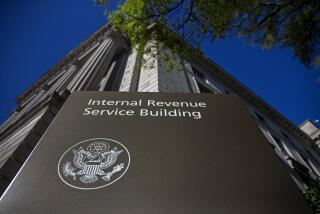Report: Apple avoided billions in U.S. taxes on foreign income
- Share via
This post has been corrected. See the note at the bottom for details
WASHINGTON -- Apple Inc. has used an elaborate web of offshore subsidiaries to avoid paying billions of dollars in U.S. taxes on $44 billion in foreign income over the past four years, a Senate investigation has found.
Many of the tactics, such as cost-sharing arrangements, are common among large multinational corporations seeking to shift profits to countries with lower tax rates. The investigation did not find Apple violated any laws.
But three of its subsidiaries in Ireland claim to have no responsibility to pay income taxes to any country, according to a 40-page, bipartisan report released Monday by the Senate Permanent Subcommittee on Investigations.
One of those subsidiaries, Apple Operations International, which has no employees but reported $30 billion in income from 2009-2012, has not filed an income tax return in any country for the past five years, the investigation found.
“Apple wasn’t satisfied with shifting its profits to a low-tax, offshore tax haven,” said Sen. Carl Levin (D-Mich.), the subcommittee’s chairman and a longtime advocate for tightening U.S. corporate tax laws. “Apple sought the Holy Grail of tax avoidance.”
Quiz: Test your Apple knowledge
Chief Executive Timothy Cook is scheduled to testify Tuesday about the company’s tax practices at a hearing by the subcommittee on offshore profit shifting. Apple’s chief financial officer, Peter Oppenheimer, and its head of tax operations, Phillip Bullock, also are scheduled to testify.
In written testimony prepared for the hearing, Apple said the company is “a powerful engine of job creation in the U.S.” and “pays an extraordinary amount in U.S. taxes” — $6 billion last year.
Apple said it does not use “tax gimmicks.”
“Apple has substantial foreign cash because it sells the majority of its products outside the U.S.,” the company said.
The report follows a similar one last year of tax-avoidance practices by Microsoft Corp. and Hewlett-Packard Co. as the subcommittee has focused on multinational high-tech companies, in part, because of their ability to shift costs related to intellectual property to low-tax countries such as Ireland, Bermuda and the Cayman Islands.
The findings come as key Republican and Democratic lawmakers, urged on by the White House, are looking to overhaul the tax code, including eliminating some business breaks and lowering the corporate rate to try to make the U.S. more competitive globally.
The U.S. has a 35% corporate tax rate and, combined with state and local taxes, has the highest rate among developed nations. The effective rate, however, is much lower.
Companies can stash foreign earnings abroad and do not have to pay U.S. taxes on the money until it is brought back to the U.S. The subcommittee report cited private estimates that U.S. multinational companies have more than $1.7 trillion in foreign earnings parked overseas.
Of Apple’s $145 billion in cash as of April, about $102 billion is overseas. By keeping profits offshore, the company was able to reduce its effective tax rate to 24.2% in 2011.
Cook said last week that he planned to urge lawmakers to dramatically simplify corporate tax laws. Among the changes he planned to propose was is to lower the rate paid on foreign earnings brought back to the U.S.
Republicans also have pushed for reducing the tax rate on foreign earnings by U.S. firms. But they are at odds with President Obama and many Democrats who want to set a new minimum tax rate on foreign corporate profits, even if they are never brought back to the U.S.
Ireland is key to Apple’s tax strategy, the investigation found. The country has a 12% statutory tax rate, though Apple has negotiated a rate of less than 2% on its operations there.
From 2009-2012, Apple shifted $74 billion in income from sales outside of North and South America to Apple Sales International, one of three subsidiaries in Ireland, through complex cost-sharing agreements. For those three years, the company paid less than 1% in taxes on those sales, well below even the low rate it had negotiated with Ireland, the report said.
For example, Apple Sales paid $10 million in taxes on $22 billion in earnings in 2011, resulting ina tax rate of 0.05%, the report said.
Apple told subcommittee investigators that Apple Sales, along with Apple Operations International and Apple Operations Europe, all based in Ireland, are not responsible for paying taxes there because they are not managed or controlled in that country, a requirement under Irish law.
And they are not required to pay taxes in the U.S. because they aren’t physically located here.
In its prepared testimony, Apple said that it began operations in Ireland in 1980 and that its subsidiaries there, including a fourth one, Apple Distribution International, “employ nearly 4,000 people and pay taxes there as required by Ireland.”
[For the record, 3:15 p.m., May 2: A previous version of this post and headline said Apple Inc. avoided paying at least $44 billion in U.S. taxes over the past four years. The company avoided paying billions of dollars in taxes on $44 billion in offshore income.]
ALSO:
State dairy farmers seek bigger share of whey windfall
Healthy savings, no debt but worried about retirement
Yahoo seeks turnaround with $1.1-billion deal to buy Tumblr
More to Read
Inside the business of entertainment
The Wide Shot brings you news, analysis and insights on everything from streaming wars to production — and what it all means for the future.
You may occasionally receive promotional content from the Los Angeles Times.












